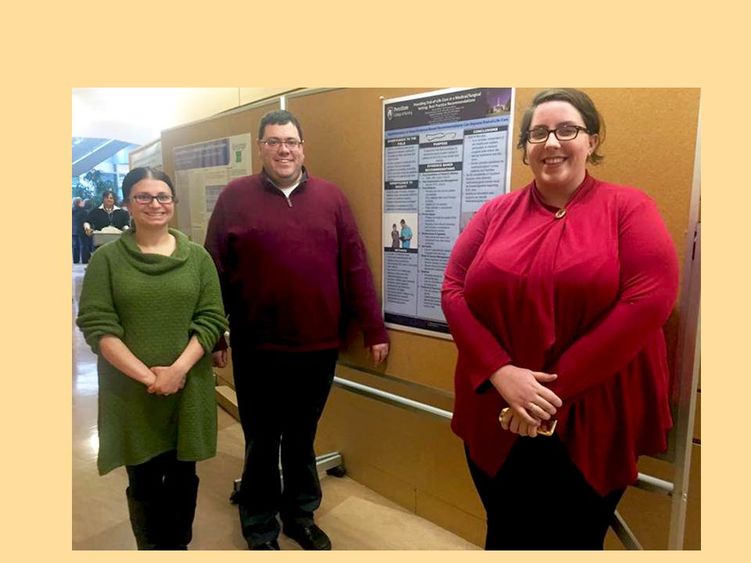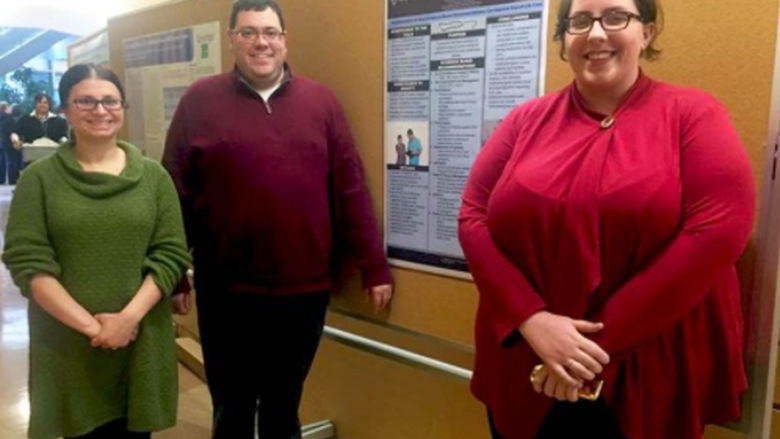
Honors nursing student Kiernan Riley recently presented her research at the Seventh Annual Perspectives in Nursing and Healthcare Conference, held at Geisinger’s Henry Hood Center for Health Research in Danville. With her, from left, is nursing instructor Justina Ferguson and assistant clinical professor of nursing, Dr. Michael Evans, who is also the campus' assistant chief academic officer.
DUNMORE, Pa. — Kiernan Riley, an honor’s nursing student at Penn State Worthington Scranton, has been researching end-of-life care and patients living with end-stage heart failure for over a year now with Dr. Michael Evans, PSWS assistant clinical professor. In January, she had the opportunity to present pieces of that research at a conference hosted by Geisinger Medical Center in Danville.
The Seventh Annual Perspectives in Nursing and Healthcare Conference was held Jan. 26 at Geisinger’s Henry Hood Center for Health Research, Danville. It was a full-day conference that encompassed topics relevant to professional nursing, medical and healthcare provider practice and offered evidence-based, grounded applications of nursing and medical science.
Riley’s project was titled: "Providing End-of-Life Care in a Medical/Surgical Setting: Best Practice Recommendations," and was co-authored by Evans, Ph.D., MSEd, RN, ACNS, CMSRN, CNE; Justina Ferguson MSN, RN, instructor in nursing; Gina Harrison, RN, ASN, RN – BS student; Melissa B. Miner, MSN, RN, CNE; Allyson Favuzza, MSN, CRNP, FNP-C, DNP student; and Alexandria Shaffer, RN, ASN, RN-BS student.
“I have been working with Michael Evans since Fall 2015 on his research involving end-stage heart failure patients,” Riley explained. “This current research on best practices of end-of-life care in a medical surgical setting is a natural progression of his research as we try to improve the quality of life for patients at the end-of-life. The project was started in July of 2016 and is currently on-going.”
This research project was Riley’s first as a lead author for a poster presentation at a regional level conference, but was not her first foray into medical research. She has been involved with Evans’ research since her sophomore year and presented pieces of the research at Penn State Worthington Scranton’s annual Undergraduate Research Fair last year.
Her previous research focused on palliative care and pharmacological palliation in end-stage heart failure patients, and she has now expanded to her current topic.
In conducting her research, Riley said the most challenging part was digging through all of the available information. “The wealth of information available to scholars today is cumbersome,” she said. “Thus, the most challenging part was reviewing and critiquing the literature to synthesize the best practice recommendations available to assist medical-surgical nurses in the care of patients at the end-of- life.”
Despite some of these challenges, Riley found aspects of the research to be enjoyable. “The most interesting part of this research for me was learning the research process and how to formulate evidence based practice guidelines to improve the care we provide to patients at the end-of-life,” she said. She also enjoyed having the opportunity to work with some of her professors and peers on research relevant to her chosen field.
In addition, presenting her findings on a regional level allowed her to experience another type of audience, which she felt was a useful networking opportunity. “I hope to have more opportunities like this in the future,” she said. “I will continue as Dr. Evans’ undergraduate research assistant in his longitudinal study of somatic awareness and self-symptom recognition in community dwelling stage D heart failure patients.”
While still unsure of her long-term clinical focus, Riley said she can definitely see this as a research trajectory going forward, as she pursues advanced education. In the meantime, the junior nursing student said she remains busy with her studies and serving as president of the Student Nurses Association on campus.

